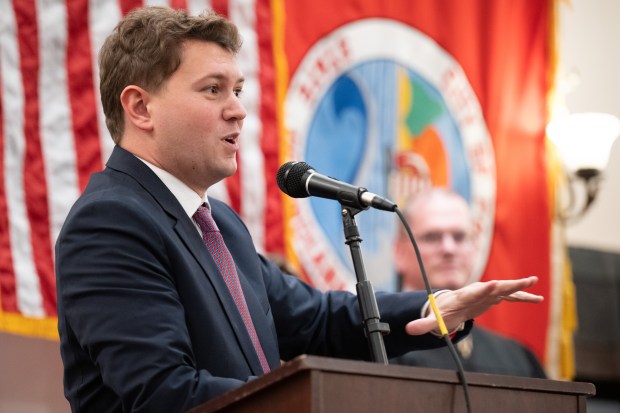While the U.S. Supreme Court overturned former Portage Mayor James Snyder’s conviction on a felony bribery charge Wednesday, his conviction on defrauding the IRS stands, as does the possibility that he could turn to the city of Portage and ask for reimbursement for his legal fees in the bribery case since the charge involved his duties as mayor.
As city officials weigh what that request might entail, one of Snyder’s attorneys hopes to get his conviction for defrauding the IRS through his personal business dismissed as well.
With a 6-3 vote, the Supreme Court ruled in its decision that the $13,000 payment Snyder received after providing the owners of Great Lakes Peterbilt with a $1 million contract for new garbage trucks was a gratuity and not a bribe.
The 18-page opinion, written by Justice Brett Kavanaugh, ruled that the bribery statute commonly known as 666, which is its number in the federal criminal code, applies only to quid pro quo agreements and does not include “gratuities,” meaning rewards given to elected officials after the fact.
Snyder, a Republican who was first elected mayor in 2011 and reelected in 2015, a term cut short by his federal conviction in February 2019, has said he couldn’t comment on the court’s decision.
Snyder received a sentence of 21 months in prison for the bribery and IRS convictions and a year on supervised release from U.S. District Court Judge Matthew Kennelly.
Procedurally, said Indianapolis attorney Jackie Bennett Jr., Snyder will need to be re-sentenced since the more serious of the two charges has been overturned. Snyder remained free during his appeal.
“The tax charge was much less serious than the bribery charge and we do not believe he should have jail exposure if the tax charge is not dismissed,” Bennett said.
Bennett represented Snyder during his two trials in U.S. District Court in Hammond. He stepped back as Snyder’s lead attorney when the 7th Circuit Court of Appeals in Chicago picked up the case and court-appointed attorney Andréa Gambino started representing him.
Still, Bennett said he has remained involved in the case informally since the end of Snyder’s second trial in district court.
He doubts whether the tax count will survive a court challenge since Snyder paid the money back before he was even charged, and expects Snyder to file to have that charge dismissed.
“The judge’s sentence was really based on the bribery count,” Bennett said, adding if the tax case is dismissed as well, Snyder will be “free to go on his way as he deserves.”
Portage Mayor Austin Bonta speaks after being sworn in during a ceremony at Portage’s Woodland Park on Thursday, December 21, 2023. (Kyle Telechan for the Post-Tribune)
As far as the legal fees, Portage Mayor Austin Bonta and City Councilman Collin Czilli, D-5th, said Snyder has yet to ask the city for reimbursement, and at this point, they have no idea of the extent of the former mayor’s legal expenses or what he might ask for from the city.
Under Indiana Code, the fiscal body, the city council in this case, “shall reimburse the officer or employee for reasonable and customarily charged expenses, as determined by the fiscal body of the unit or municipal corporation, incurred in the officer’s or employee’s defense against those charges, if all charges have been dismissed or the officer or employee has been found not guilty of all charges.”
Around eight years ago, Snyder attempted to recoup $93,000 in legal fees from the city’s Utility Services Board but by the time he and the board worked out the details, Czilli said, he’d been indicted in the federal court cases and the request was a moot point.
“No one on the city council side would have any knowledge” about the breadth of Snyder’s legal fees, said Czilli, who’s been on the council for almost nine years.
Whether the cost is in the hundreds of thousands of dollars, or millions of dollars, “anything would be a financial hit and there is absolutely no certainty that we are required to pay anything,” Czilli said.
Since the felony conviction on the IRS count stands, Czilli said he would argue that Snyder isn’t eligible for any reimbursement from the city.
“This process is going to take time. It’s not a clear-cut ‘You have to pay the bill,’” he said, adding the council would do its due diligence.
He also doesn’t know where the money, regardless of the amount, would come from, since the city’s total budget is around $66 million, and 25% of that is consumed by salaries and benefits, though the city is doing OK financially.
“It’s not like our budget has millions just sitting there, unappropriated, and I don’t know which funds we could use,” he said.
Since Snyder already tried once to get the city to pay his legal expenses, Czilli said, “I fully expect him to do it again.”
Officials can request reimbursement under state statute, Bonta said, but “the fiscal body has the ability to determine reasonable legal fees.”
At this point, city officials don’t know if a request is going to be made or what a “reasonable” sum might be, he added.
Porter County Commissioner Laura Shurr Blaney, D-South.– Original Credit: Laura Shurr Blaney
Meanwhile, Lake and Porter County officials are taking a look at their ordinances to assess what’s needed to prevent large cash gratuities to officeholders and employees.
Porter County Commissioner Laura Blaney, D-South, said she will propose a gratuities ordinance for the county at the board’s July 16 meeting.
She gleaned from the Supreme Court’s ruling that any restrictions on gratuities had to be in place at the local level.
“Getting large sums of money as gratuities for actions we take in office doesn’t smell right to me,” said Blaney, who is researching the issue.
County officials have to figure out where to draw the line.
“At Christmastime, vendors send us cheese and poinsettias, so we need to figure out what is OK, but large sums of money? No,” she said.
Lake County has a conflict of interest ordinance that states that county employees cannot use their position to obtain gifts or favors from vendors, excluding gifts less than $100 or a group dinner or social activity planned by a vendor.
Under the ordinance, “it may be a conflict of interest” for employees to engage in outside consulting work while employed for a county department. Any consulting work should be reported in writing and approved by the Board of Commissioners.
The ordinance also addresses bribes by stating: “It is illegal to accept a bribe (money, goods, an item of value, property, privilege or promise which is offered or given with a corrupt intent to influence an action, vote or opinion) in return for influencing the awarding of a contract purchase of goods or services, or to influence performance of County services.”
Lake County Commissioners President Michael Repay said any county ordinance only applies to county employees and those elected or appointed to a position.
A county ordinance only goes so far, Repay said, so with the recent Supreme Court ruling the issue would be best addressed by the state legislature.
“It’s nice, but it seems superficial to do something,” Repay said.
Despite the Supreme Court ruling, Repay said elected officials have to be mindful of their actions and interactions with others.
“They found it lawful, but I don’t know if that means it’s necessarily right. We have to hold ourselves to a higher standard,” Repay said.
alavalley@chicagotribune.com




